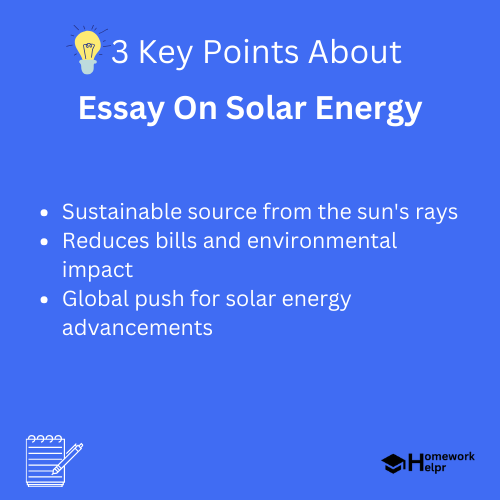📝 Summary
Solar energy is one of the most abundant and sustainable energy sources, obtained from the sun’s rays. It can generate electricity and heat through technologies like solar thermal and solar photovoltaic systems. Despite its advantages, like reducing electricity bills and being environmentally friendly, challenges such as intermittency and high initial costs exist. Global initiatives aim to enhance solar technology and affordability, ensuring a promising future for solar energy. The ongoing advancements represent a significant solution for a cleaner and greener planet.
Essay On Solar Energy
Solar energy is one of the most abundant and sustainable sources of energy available to us. It is derived from the sun’s rays and can be harnessed through various technologies. With the increasing rise of global temperatures and the depletion of non-renewable resources, solar energy has emerged as a vital solution for a cleaner and greener future.
What is Solar Energy?
Solar energy refers to the energy obtained from the sun’s radiation. It is used to generate electricity, heat, and even power solar cars. This energy can either be captured using solar thermal or solar photovoltaic systems. Solar thermal systems utilize heat from the sun to produce steam, which can then generate electricity, while photovoltaic systems convert sunlight directly into electricity.
Definition
Photovoltaic: A technology that converts solar energy directly into electricity using solar cells. Sustainable: Capable of being maintained with minimal long-term impact on the environment.
Examples
For instance, a solar panel installed on a roof converts sunlight into electricity to power a home, consequently reducing reliance on fossil fuels.
Types of Solar Energy Technologies
There are primarily two types of solar energy technologies: solar thermal and solar photovoltaic. Each method has its unique characteristics and applications.
- Solar Thermal Energy: This technology uses mirrors or lenses to concentrate sunlight and produce heat. This heat can be used to generate electricity through steam turbines.
- Solar Photovoltaic Energy: This method employs solar panels that consist of semiconductor materials to convert sunlight into electricity.

Advantages of Solar Energy
Opting for solar energy comes with numerous advantages, making it an attractive choice for both residential and commercial users.
- Renewable Energy Source: Solar energy is inexhaustible, as the sun provides ample energy that can meet the world‚’ energy needs.
- Reduces Electricity Bills: By generating your own electricity, you can significantly lower your utility bills.
- Environmentally Friendly: Solar energy systems produce no greenhouse gas emissions during operation, leading to a reduction in pollution.
- Low Maintenance Costs: Once installed, solar energy systems require minimal maintenance.
❓Did You Know?
Did you know that if you could capture all the sun’s energy that hits Earth in one hour, it would be enough to power the world for a whole year?
Challenges of Solar Energy
While solar energy has a lot of potential, it is not without challenges. Understanding these challenges is crucial for making informed decisions regarding energy use.
- Intermittency: Solar power generation depends on sunlight, which can fluctuate based on weather conditions and time of day.
- Initial Cost: The initial investment for solar panels and installation can be high, which may deter some individuals.
- Space Requirements: Solar panels require substantial space, which can be a limiting factor for urban areas.
Definition
Intermittency: The variability in the availability of a power source, which can affect energy supply. Solar panels: Devices that convert light energy into electrical energy through the photovoltaic effect.
Examples
For instance, a solar power system may not produce enough energy during cloudy days or during the night, making it necessary to have a backup energy source.
Global Initiatives and Advancements in Solar Energy
With countries around the world recognizing the importance of solar energy, there has been a significant push towards its development. Governments, organizations, and research institutions are investing in solar technology to improve efficiency and affordability.
- Incentives: Many countries offer tax credits, rebates, and other financial incentives to encourage solar energy use.
- Innovations: Research is ongoing to develop more efficient solar cells and energy storage solutions.
- Global Agreements: Climate agreements like the Paris Agreement promote the transition to renewable energy sources, including solar.
Future of Solar Energy
The future of solar energy looks promising, with ongoing advancements in technology and a global shift towards sustainability. It is expected that the efficiency of solar systems will continue to improve, making them more accessible to the general public.
- Emerging Technologies: Innovations such as solar panels integrated into building materials and transparent solar cells are emerging.
- Global Integration: Solar energy could play a significant role in harmonizing energy use globally, reducing reliance on fossil fuels.
- Job Creation: The solar sector is expected to create numerous job opportunities, stimulating the economy.
Examples
For example, some futuristic buildings are being designed to incorporate solar panels as part of their exterior, effectively turning the whole building into an energy generator.
Conclusion
In conclusion, solar energy represents a vital piece of the puzzle in achieving a sustainable future. By harnessing the immense power of the sun, we can alleviate the growing energy crisis while minimizing our impact on the environment. As advancements continue and costs decrease, it is crucial for individuals and communities to consider adopting solar technologies. Together, we can pave the way for a cleaner, greener planet.
Related Questions on Essay On Solar Energy
What is solar energy?
Answer: Solar energy is derived from the sun’s radiation.
What are the types of solar technologies?
Answer: The two main types are solar thermal and photovoltaic.
What are the advantages of solar energy?
Answer: It is renewable, reduces bills, and is environmentally friendly.
What are challenges of solar energy?
Answer: Intermittency, initial costs, and space requirements.
